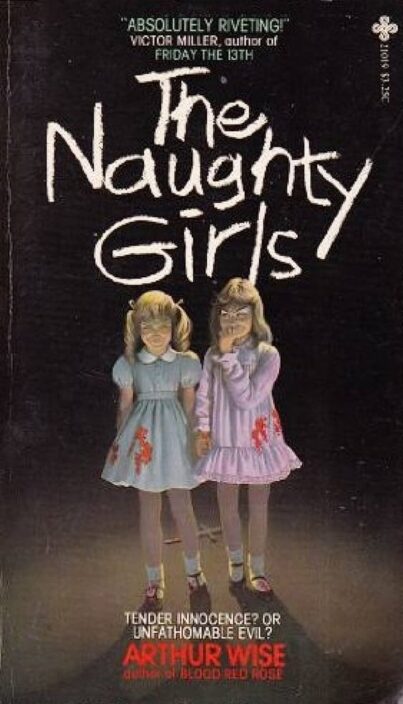 By ARTHUR WISE (Playboy Paperbacks; 1972/80)
By ARTHUR WISE (Playboy Paperbacks; 1972/80)
Yet another case of misleading horror novel cover art? Most definitely. That front cover illustration is as horrific as they come, yet the novel it graces is actually a mainstreamy thriller that despite a couple passages of LET’S GO PLAY AT THE ADAMS’-like queasiness never quite breaches horror territory. Nor is it the “Absolutely riveting” (so claims author Victor Miller) account featuring “one of the great anti-heroines of all time” (so claims Robert Bloch) promised by the critical blurbs.
Another issue: the cover portends a pair of “Naughty Girls” when in actuality there’s only one. That would be Thelma, a sociopathic British girl who’s just turned nine; the term “Bad Seed” is never mentioned, but it accurately describes Thelma’s nature. She’s living with her widowed mother, her uncle and her older brother Richard in a French seaside village. There Thelma meets Elizabeth, a fellow nine-year-old who for a time becomes Thelma’s confidante, and also Bob Burger, an American businessman who’s absconded to France with his wife Dorothea after stealing a great deal of money.
The fun begins when Thelma and Elizabeth spy Bob and Dorothea having sex, and Thelma decides to use a camera (gifted by Bob) to capture them in the act. The pictures are developed by Richard, an amateur photographer who does Thelma’s bidding after she threatens to spill the beans about an affair he’s been having with a local servant woman. More blackmail follows when Thelma uses the pictures to anonymously demand a ransom from Bob—who, believing his nefarious activities have been uncovered by someone in authority, makes sure to pay it.
But of course Thelma’s harassment campaign isn’t finished. She decides to up the stakes, leading to a home break-in and petty theft. Elizabeth decides she doesn’t want to be part of Thelma’s evil doings, while Richard grows increasingly lovesick and the police become involved, with murder, false accusations and an annoyingly open-ended denouement on the none-too-distant horizon.
I’m not sure I’d call this book well written, but the prose is not without a certain refinement. It has a terse, hard-boiled flow, consisting largely of frank, nuance-free descriptions. That’s a necessity given the plot-driven narrative, which is highly reliant on happenstance and somewhat deficient in characterization. Thelma’s evil nature is left largely unexplored, being taken as a given that, conversely, none of the adult characters ever pick up on—the novel, after all, would be much shorter if they did.
